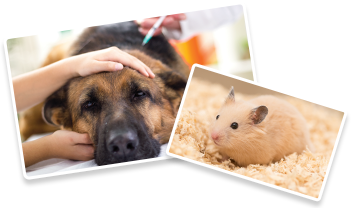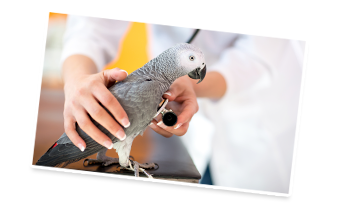-
Sidmouth Parade Clinic
0208 459 3010
-
Neasden Clinic
0208 450 1334
-
Sidmouth Parade Clinic: 0208 459 3010
-
Neasden Clinic: 0208 450 1334
Sidmouth Parade Clinic: 0208 459 3010
Neasden Clinic: 0208 450 1334

Whether you have a parrot, canary, budgerigar, cockatiel or something more exotic, birds can provide great companionship without the physical responsibility that comes with owning larger pets. But despite this birds still need stimulation and attention, especially if they are being kept cages.
A pet bird is entirely reliant on its owner for everything in its life. As the source of its happiness and health it is important to understand the responsibility that accompanies a pet bird. Ideally all birds would be able to fly freely, but with the right planning you can ensure a healthy, mutually benefitial relationship.
As a general rule for housing, bigger is better. Your cage should be big enough for your bird to stretch its wings, exercise and entertain itself. This is the absoilute minimum, and if you have limited space for your birdcage it is always advisable to house smaller birds in a happier environment than a larger bird in a confined one.
Tall, narrow cages are inpractical as birds do not naturally fly directly up and down. Rectangular cages are generally the most efficient in terms of space, while metal cages are the most practical to clean.
Within the cage the bird will be happiest if it has multiple perches of varying height, thickness and texture. You should aim to recreate the conditions of the bird's natural habitat as best as possible. Wood is generally the most suitable perch material for wearing down the bird's nails, and while many birds make a habit of chewing and destroying toys, these are easy to replace. Birds can be destructive in the same manner as puppies and kittens, and minor changes in its environment can contribute greatly towards its happiness.
Most domesticated birds are highly intelligent, interactive and sociable. They naturally live in flocks, so while they enjoy human interaction most birds will be happiest living in pairs or groups.
There are some species that may be kept as single pets, however these will require significantly more attention from their owners and risk getting lonely. It is thus essential the bird's happiness that prospective owners research the species they are thinking of adopting before making the commitment. If space is an issue we would always recommend two smaller birds of a solitary large one.
Whatever the species, birds' intellgience means that they should be allowed a generous living space with plenty of stimulation. This might come in the form of various perches, toys and food types, as well as ensuring they are able to view outside.
These intelligent animals are a responsibility, requiring love just like any other pet and should be afforded the same attention that you would give to a dog or cat.
In the wild, a bird will do everything to maintain a strong and healthy appearance - they are prey species and a visibly sick bird will be the first to be targeted. Consequently by the time a bird shows signs of illness it is likely that it has been unwell for some time.
Bird owners should thus pay close attention to their bird and learn to recognise the subtle signs that may indicate the bird is ill. Any change in a bird's regular appearance may be a sign that it is unwell and shouldn't be overlooked.
One of the most common causes of illness in domesticated birds is improper diet. Trauma, poor upkeep or hygeine, stress, genetics and contact with outside birds may also contribute to ill health.
The following signs may indicate that your bird is sick:
- Changes in regular behaviour or appearance.
- Irritiability or agitation.
- Poor general appearance, unkempt feathers or an abnormnally fluffy coat.
- Swolen or cloudy eyes, sneezing, discharge from the eyes or nostrils.
- Irregular breathing, a change in voice or no voice.
- Lack of appetite, weight gain or loss, changes in amounts of food eaten.
- Drooping wings or tail 'bobbing' with each breath.

Ensuring that your animal is fully up to date with their vaccinations is one of the most important things you can do to safeguard their health as a pet owner.
Click here for key information on what, and when, you should be doing.

Our Pet Health Club is an easy and affordable way to ensure your pet is covered when it comes to preventative health.
The scheme includes everything necessary for the prevention of fleas, worms and other parasites, as well as routine vaccinations.